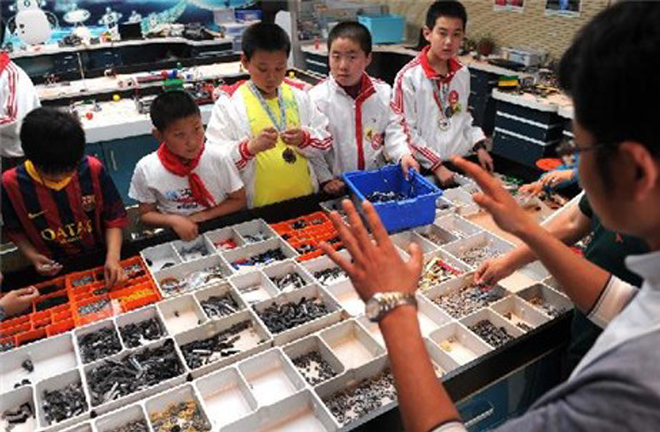CHU YUANHUI: Test scores fail to predict success; reform needed

Robot education is entering the classroom. Cultivation of creative spirit and ability in practice has become the target and value pursuit of contemporary education.
China’s national college entrance exam is commonly known as the “gaokao.” Gaokao top scorers are students who score the highest in the exam in their cities or provinces. In recent years, gaokao top scorers have become a hot topic. They are widely discussed throughout society.
Two different views on gaokao top scorers have come into being. On one hand, gaokao top scorers are considered social elites who should be worshipped. On the other hand, many of them are thought to actually be underachievers based on some tracking investigations and interviews. So, how should we treat gaokao top scorers? What kind of education do we need and how can we conduct educational reform?
A gaokao top scorer proves successful in the present educational system. Actually some of them have flourished after entering society, but many are not so excellent as expected.
Under China’s current exam system, students’ scores are determined by their memory, learning capacity, attention to detail and ability to solve modeling problems. One’s success is surely related to these factors but not completely dependent on them.
According to research on contemporary pedagogy, psychology, science of personnel and sociology, cognitive competence and intelligence are indispensable elements for one’s success, but nonintellectual factors, such as emotion, attitude, willpower, tenacity, social adaptability and communication skills, constitute the cornerstone of a successful career. In an educational environment where scores reign supreme, not every gaokao top scorer is fully developed in the aforementioned qualities.
Careful analysis of gaokao top scorers can guide educational reform. First, we should change the educational values based on knowledge standard. Undoubtedly, it is of great significance for students to grasp knowledge, which is precious spiritual wealth inherited by human society. However, our current education has pushed knowledge to an extreme.
Guided by a one-sided emphasis of knowledge over abilities, teachers just pass on systematic knowledge to students while students memorize and recall what they have learned to achieve high scores on the exams. Such an educational method neglects the comprehensive development of students’ abilities.
Second, we should be further clear about the value and function of education. In today’s society, what is an ideal education? As a social activity, education aims to promote the comprehensive development of students’ qualities, with individuality and personality at the core. Meanwhile, the knowledge-based economic society has led to higher requirements for students in terms of innovative and practical capabilities. Therefore, based on the comprehensive development of abilities, cultivation of creative spirit and ability in practice has become the target and value pursuit of contemporary education.
Third, international perspective is needed in our educational reform. Gaokao top scorers’ low performance has drawn our attention to the differences between Chinese and Western education. Generally speaking, China’s education emphasizes acceptance of systematic knowledge and solid training in solving problems. Western education respects personality and stresses the openness of student thinking while attempting to cultivate the ability to design and operate, which are skills essential to the development of a knowledge-based economy. Therefore, in the context of globalization, China’s educational reform should be conducted in a comparative way to achieve the goal of seeking common development with other countries.
Chu Yuanhui is from the School of Education Science at Dali University, Yunnan Province.
